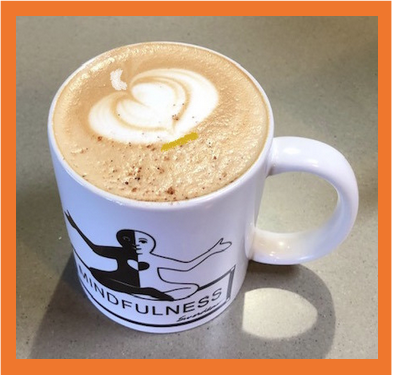
Living mindfully invites us to AWAKEN and learn to be aware in each moment. We practice TUNING IN to life with all of our senses—seeing, hearing, smelling, tasting, touching.
“The challenge is to make calmness, inner balance, and CLEAR SEEING part of everyday life.
In the same way that it is possible to be mindful whenever we are walking,
we can attempt to bring moment-to-moment attention
to the tasks, experiences, and encounters
of everyday life.”
— Jon Kabat-Zinn
Now, let’s explore mindfulness, as it relates to drinking a cup of TEA or COFFEE. We’ll imagine staying FULLY PRESENT during the beginning, the middle, and the ending of the experience.
 For example, let’s picture ourselves being present while standing in line, at our favorite coffeehouse* (beginning). We’re waiting to place our order and pay for our beverage. While waiting, we smell the delicious coffee fragrances and curiously notice the people around us.
For example, let’s picture ourselves being present while standing in line, at our favorite coffeehouse* (beginning). We’re waiting to place our order and pay for our beverage. While waiting, we smell the delicious coffee fragrances and curiously notice the people around us.
Next, we receive our hot drink and sit down at a table to sip it (middle). As we inhale the steamy scents and savor the taste, we breathe deeply. We enjoy the warmth beneath our fingers, as we gently grasp our cup. While listening to the coffee house noises, we glance out the window to see what’s going on outside.
Later, we take the last sip of our warm beverage (ending). We stand up, stretching a bit, before mindfully placing our cup into the appropriate bin. We leave, feeling grateful and satisfied.
So, there you have a relatable example
of being AWARE during different stages
and embracing the present moment.
Now, the opposite of mindfulness is sleepwalking in our lives. We may be tuned in to our minds (thoughts), but we may be asleep when it comes to our bodily responses—or our emotional responses.
When this happens, it’s easy to resist natural stages—especially endings—and feel disappointed (like after our beverage is gone), rather than embracing a moment of gratitude. Meanwhile, if we focus only on our negative responses to the ending stage, then we miss ENJOYING the pleasurable warmth of the tea or coffee in our stomachs.
In addition, if we are prone to having super high or “perfectionistic” expectations, then we will most likely struggle with all three stages—the beginnings, middles, and endings. On this path, life will never measure up to the “perfect fantasies” in our minds.
As a “recovering perfectionist” myself,
practicing mindfulness is an important tool
that I continue to be GRATEFUL for in my daily life.
As you may already know, mindfulness has become a complementary, holistic method offered for a variety of health challenges. Studies researching the effectiveness of mindfulness have shown that, for a majority of participants, pain-related drug use decreased, whereas activity levels and feelings of self-esteem increased. Whoo hoo!
For this reason, during private sessions, I teach clients how to reduce stress by becoming more mindful. When we’re listening, our somatic or bodily responses offer important messages. Unfortunately, when these messages are ignored, the symptoms often become louder and may include an escalation of physical pain in an attempt to get our attention.
We might think of pain (physical and emotional) as nature’s way of sounding a warning alarm. Frozen or stuck feelings and memories can create a sense of dis-ease in the mind and the body. When left unaddressed, these painful emotions and memories may eventually manifest in the form of stress-related diseases.
Finally, when we practice staying present—during beginnings, middles, and endings—we tune in to our mind-body wholeness.
By doing so,
we discover the secret
to savoring the subtle,
precious moments
of our lives.


